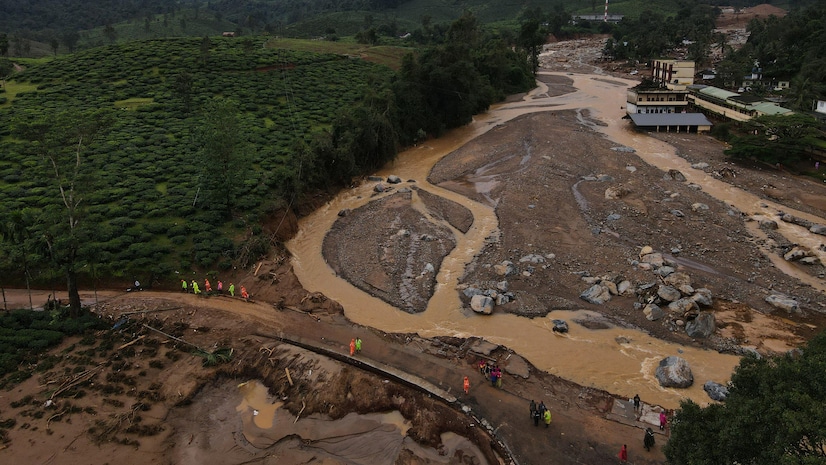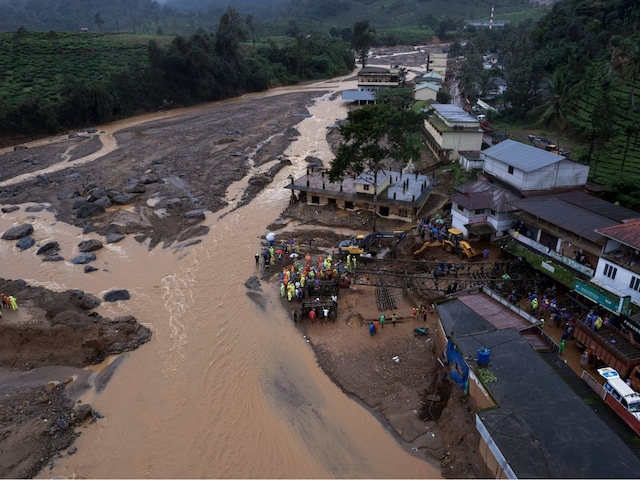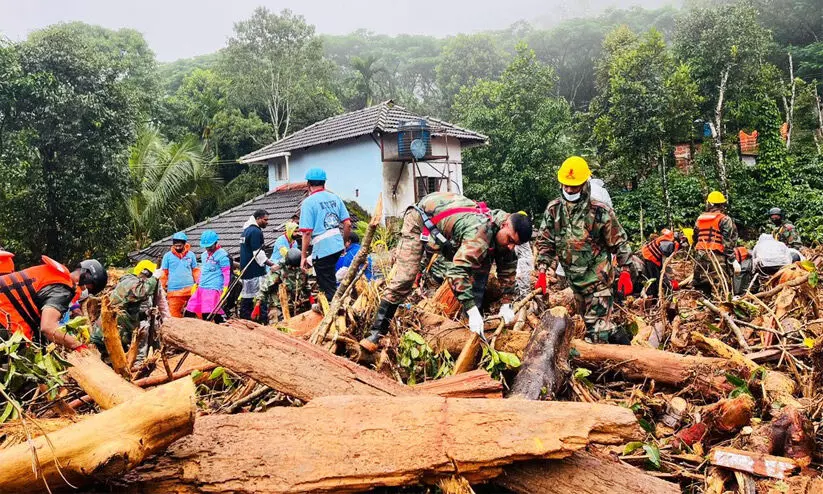Amidst Ruin, Humanity Reigns: Compassion and Solidarity Shine Through Wayanad Landslide Aftermath

By Najiya O, TwoCircles.net
Wayanad (Kerala): At around 2:40 a.m. on July 30, Feroz Khan received a phone call about the landslide in Wayanad. Residing in Nilambur, 20 kilometers from the affected area and along the banks of the Chaliyar River, which originates in Wayanad, he and his family, along with their neighbors, remained awake, worried about rising water levels. As the water level receded the next morning, Khan took a walk along the river with his mother, wife, and sister. They were stunned to see debris—furniture, gas cylinders, trees—floating in the river. However, what they encountered next was even more shocking. Near the shore, they noticed a strangely shaped object and, upon closer inspection, were horrified to find it was the lifeless body of a young child, around four years old.
Recovering from the initial shock, Khan promptly contacted the Trauma Care Centre and the police helpline to report the grim discovery. He soon learned that dead bodies had been found and recovered from various parts of the river. As the news spread, local residents began searching the river and its banks. “It was traumatizing. I have a son of that age too,” Khan shared with TwoCircles.net.
On July 30, as Kerala woke up to the devastating news of landslides in Punchirimattom, Mundakkai, and Chooralmala near Meppadi in Wayanad, the people of Nilambur, just 20 kilometers away, were horrified to see bodies floating in the nearby river. This tragic scene underscored the scale of the disaster, which claimed the lives of over 400 people. More than 200 individuals remain missing, and their details are expected to be released by the state government today.
While natural calamities like floods and landslides have become increasingly common in Kerala, the triple landslides that struck last Tuesday represent an unprecedented event in the state's history. Rescue operations have commenced with urgency, reflecting the state’s resilience and response to such devastating events.
United for Rescue Operations
[caption id="attachment_450228" align="aligncenter" width="640"] ndian Army sets up temporary Bailey Bridge for rescue operations at Chooralmala in Wayanad. Picture- news18.com[/caption]
ndian Army sets up temporary Bailey Bridge for rescue operations at Chooralmala in Wayanad. Picture- news18.com[/caption]
Rescue operations commenced swiftly after the landslide, with various forces including the state police, fire department, forest department, and the NDRF all mobilizing their efforts. By noon on July 30, around 500 army personnel were on the ground, including the Madras Engineering Group, which constructed a makeshift Bailey Bridge. This temporary bridge, completed on August 1, restored vital transportation links that had been severed when the original bridge connecting Mundakkai and Chooralmala was washed away.
While the efforts of these official agencies are praiseworthy, the contributions of non-governmental organizations and local volunteers were equally remarkable. Despite the shock and devastation, the local community was quick to respond. Youth groups and volunteer wings from various political and religious organizations, including the Ideal Relief Wing of the Human Welfare Foundation, the SKSSF, the SSF, the Muslim Youth League, the Youth Congress, the SDPI, the Welfare Party of India, the DYFI, the AIYF and the Seva Bharathi, all stepped up to assist.
Although Kerala often witnesses tensions between different religious and political groups, the volunteers put aside their differences to work together in the rescue efforts. Some focused on rescuing survivors trapped under debris or in isolated areas, while others worked to recover the deceased. Young men equipped with modified off-road vehicles ventured into inaccessible areas where conventional vehicles could not reach due to heavy rain and damaged roads. Their collective efforts showcased an inspiring spirit of solidarity and resilience in the face of disaster.
In addition to the heroic rescue efforts, many volunteers provided essential support by serving food to everyone present, including the official forces, other volunteers, and local residents. One notable example was the tent set up by the Muslim Youth League, which reportedly provided breakfast, lunch, and dinner for nearly 1,000 people daily.
However, on the sixth day, the police requested that they halt their food service due to concerns about food safety. This decision was met with significant concern from many volunteers, who saw it as a potential disregard for the invaluable work of voluntary groups, given that food safety issues could be addressed by officials themselves. Following criticism and a subsequent disruption in food distribution, the government clarified that no formal order had been issued, although it reiterated its commitment to food safety.
On the first day alone, around 300 people were rescued from the debris of mud, rocks, trees, and water. In total, more than 1,500 individuals were rescued. Over 10,000 people are currently residing in temporary shelters set up in nearby areas.
The bodies of unidentified victims were buried en masse after multi-religious prayers. A total of 29 bodies and 154 body parts were laid to rest at the burial ground in Puthumala, a village that had also suffered a landslide in 2019.
Women handled bodies
At the Nilambur district hospital, a dedicated group of around 30 women played a crucial role in assisting the police and doctors with the inquest and post-mortem examinations of the bodies recovered from the Chaliyar River. Since that fateful Tuesday morning, over 200 bodies and body parts have been retrieved from the river.
[caption id="attachment_450230" align="aligncenter" width="823"] Government forces and volunteers in rescue operations, trying to remove large trees and boulders. Picture- madhyamam.com[/caption]
Government forces and volunteers in rescue operations, trying to remove large trees and boulders. Picture- madhyamam.com[/caption]
“The bodies and body parts arrived at the hospital wrapped in plastic bags, clothes, or sacks. However, many people would leave as soon as the coverings were removed. In such a distressing situation, we felt compelled to volunteer,” shared Haseena K., a social activist and member of Team Welfare. “The remains we encountered included not just limbs and torsos, but also internal organs and bodies missing various parts. These individuals must have gone to bed peacefully in their own homes. Our sole thought was that if we were in their place, someone would need to perform these tasks for us.”
The women meticulously recorded any identifying features on the remains, cleaned them with water, assisted with the inquest and post-mortem, took samples for DNA testing, and then cleaned and covered the bodies again before moving them to the mortuary.
Haseena also highlighted the generous support from organizations like the CH Centre, which provided free food to everyone involved in the operations, further demonstrating the spirit of collective solidarity during this tragic time.
The Aftermath
The landslides have rendered the three affected villages uninhabitable, leaving hundreds of people who have lost everything in a state of uncertainty. In response, the government has announced an initial township project as part of the rehabilitation efforts. Contributions are flowing into the Chief Minister’s Distress Relief Fund, despite some controversies surrounding the misallocation of funds in previous instances.
Generous support has come from across the region: Tamil Nadu Chief Minister MK Stalin has pledged Rs 5 crores for rehabilitation, while Karnataka Chief Minister Siddaramaiah has offered to build 100 houses for the victims. Rahul Gandhi, the Leader of the Opposition and former MP of Wayanad, has also committed to constructing 100 houses. Contributions are being made by film stars, industrialists, business leaders, voluntary organizations, political parties, religious groups, and educational institutions, all working together to support the affected communities.
The disaster has reignited discussions on several critical issues that had faded from the public eye since the 2018 floods. These include environmental protection, illegal quarrying, and the New Kerala initiative for sustainable development, highlighting the urgent need for comprehensive reforms and proactive measures.
